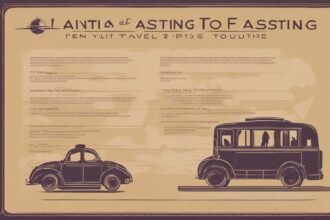Traveling abroad is an exciting adventure, but for those with dietary restrictions—whether due to religious fasting, health conditions, or personal choices—it can present unique challenges. Navigating dietary restrictions abroad requires careful planning, cultural sensitivity, and resourcefulness. Whether you’re observing a religious fast like Ramadan, following a vegan diet, or managing food allergies, this guide will help you travel confidently while adhering to your dietary needs.
Understanding Your Dietary Restrictions Before You Travel
Before embarking on your journey, it’s essential to have a clear understanding of your dietary restrictions and how they might be impacted by travel. If you’re fasting for religious reasons, such as during Ramadan, know the specific times for breaking your fast and the types of food permissible. For medical restrictions like gluten intolerance or nut allergies, ensure you’re aware of hidden ingredients that might be common in certain cuisines. Personal dietary choices, such as vegetarianism or veganism, may also require research into local food customs.
Start by creating a list of safe foods and potential risks. This preparation will help you communicate your needs effectively once you’re abroad. Additionally, consider the duration of your trip and whether you’ll need to pack emergency snacks or supplements to bridge any gaps in availability.
Researching Food Culture and Availability at Your Destination
Every country has its own culinary traditions, and navigating dietary restrictions abroad often means diving deep into local food culture before you arrive. Research the staple foods of your destination—are they heavy on meat, dairy, or gluten? Are there vegetarian or halal options widely available? Websites and travel forums can provide valuable insights into local dining options and cultural norms around food.
For instance, if you’re traveling to a country where street food is a major part of the culture, check if vendors are accustomed to accommodating dietary needs. Apps like HappyCow (for vegan and vegetarian options) or local food blogs can be lifesavers. You might also find it helpful to explore resources on traveling with dietary restrictions for destination-specific tips.
Communicating Your Needs in a Foreign Language
One of the biggest hurdles when navigating dietary restrictions abroad is the language barrier. Explaining a complex dietary need in a language you’re not fluent in can be daunting. To overcome this, prepare translated phrases or cards that clearly state your restrictions. For example, a card might read, “I cannot eat gluten due to a medical condition,” or “I am fasting and can only eat after sunset.”
There are also translation apps that can help in real-time, but having a printed card ensures clarity even in areas with poor internet access. Learning basic food-related vocabulary in the local language can go a long way, too. Politeness is key—always approach conversations with respect for local customs. For more tips on cross-cultural communication, check out our guide on travel etiquette.
Packing Essentials for Dietary Peace of Mind
Even with thorough research, there’s no guarantee that you’ll always find food that fits your dietary restrictions. Packing a small stash of non-perishable, safe foods can be a lifesaver. Items like protein bars, nuts (if you’re not allergic), dried fruits, and instant oatmeal are easy to carry and can sustain you in a pinch. If you’re fasting, consider packing lightweight, nutrient-dense foods for breaking your fast, such as dates or energy bars.
Additionally, carry any necessary medications or supplements related to your dietary needs. For travelers with severe allergies, an EpiPen or similar emergency treatment should always be on hand. Don’t forget to pack copies of prescriptions or doctor’s notes, as they may be required at customs. For more packing tips, see our post on essential travel gear.
Finding Safe Dining Options While Abroad
Once you’re at your destination, finding safe places to eat is crucial when navigating dietary restrictions abroad. Start by seeking out restaurants or markets that cater to specific dietary needs. Many international cities now have vegan, gluten-free, or halal-certified eateries, often listed on apps or travel websites. If you’re in a more remote area, look for grocery stores where you can purchase ingredients to prepare your own meals.
When dining out, don’t hesitate to ask questions about ingredients and preparation methods, even if it feels repetitive. Building a rapport with restaurant staff can also help—explaining your needs with a friendly attitude often encourages them to go the extra mile. For a deeper dive into finding safe food options, explore our article on international dining tips.
Respecting Cultural Norms While Sticking to Your Restrictions
Traveling with dietary restrictions isn’t just about finding the right food; it’s also about balancing your needs with respect for the local culture. In some countries, refusing food can be seen as impolite, so it’s important to explain your restrictions tactfully. For example, if you’re fasting or avoiding certain foods for religious reasons, a simple explanation like, “I’m observing a religious practice,” can help avoid misunderstandings.
Be mindful of communal dining situations, where food sharing might be the norm. If you’re unable to partake, express gratitude for the offer and, if possible, participate in other ways, such as engaging in conversation. Understanding cultural dining etiquette can enhance your travel experience—check out our guide on global food customs for more insights.
Disclaimer: The information provided in this article is for general guidance only and should not be considered medical or professional advice. Always consult with a healthcare provider or dietitian before making significant changes to your diet, especially when traveling with medical dietary restrictions. The authors and publishers are not responsible for any adverse effects or consequences resulting from the use of the information in this post.
References
- Centers for Disease Control and Prevention – Nutrition and Travel
- World Health Organization – Healthy Diet Fact Sheet
- U.S. Food and Drug Administration – Advice About Eating with Food Allergies
- Lonely Planet – Traveling with Dietary Restrictions
- British Nutrition Foundation – Travel and Dietary Needs
This content is for informational purposes only and not a substitute for professional advice.






